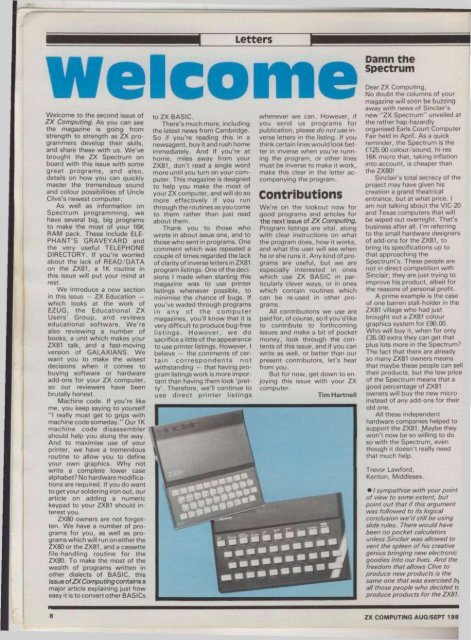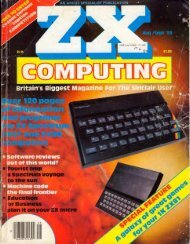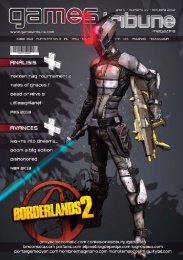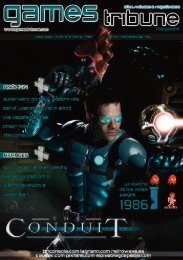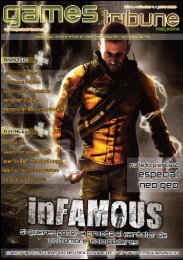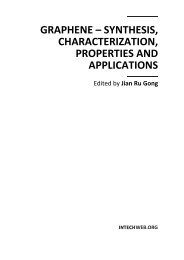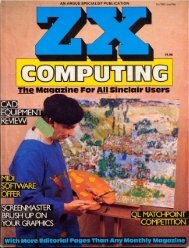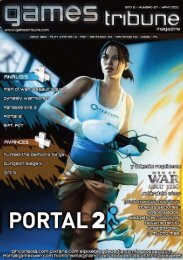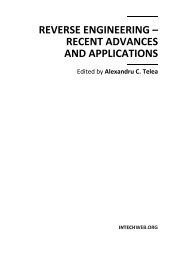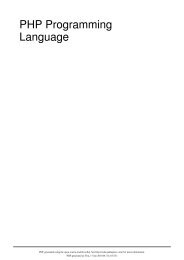ZX Computings - OpenLibra
ZX Computings - OpenLibra
ZX Computings - OpenLibra
You also want an ePaper? Increase the reach of your titles
YUMPU automatically turns print PDFs into web optimized ePapers that Google loves.
Welcome to the second issue of<br />
<strong>ZX</strong> Computing. As you can see<br />
the magazine is going from<br />
strength to strength as <strong>ZX</strong> programmers<br />
develop their skills,<br />
and share these with us. We've<br />
brought the <strong>ZX</strong> Spectrum on<br />
board with this issue with some<br />
great programs, and also,<br />
details on how you can quickly<br />
master the tremendous sound<br />
and colour possibilities of Uncle<br />
Olive's newest computer.<br />
As well as information on<br />
Spectrum programming, we<br />
have several big, big programs<br />
to make the most of your 16K<br />
RAM pack. These include ELE-<br />
PHANT'S GRAVEYARD and<br />
the very useful TELEPHONE<br />
DIRECTORY. If you're worried<br />
about the lack of READ/DATA<br />
on the <strong>ZX</strong>81, a IK routine in<br />
this issue will put your mind at<br />
rest.<br />
We introduce a new section<br />
in this issue — <strong>ZX</strong> Education —<br />
which looks at the work of<br />
EZUG, the Educational <strong>ZX</strong><br />
Users' Group, and reviews<br />
educational software. We're<br />
also reviewing a number of<br />
books, a unit which makes your<br />
<strong>ZX</strong>81 talk, and a fast-moving<br />
version of GALAXIANS. We<br />
want you to make the wisest<br />
decisions when it comes to<br />
buying software or hardware<br />
add-ons for your <strong>ZX</strong> computer,<br />
so our reviewers have been<br />
brutally honest.<br />
Machine code. If you're like<br />
me, you keep saying to yourself<br />
"I really must get to grips with<br />
machine code someday." Our 1K<br />
machine code disassembler<br />
should help you along the way.<br />
And to maximise use of your<br />
printer, we have a tremendous<br />
routine to allow you to define<br />
your own graphics. Why not<br />
write a complete lower case<br />
alphabet? No hardware modifications<br />
are required. If you do want<br />
to get your soldering iron out, our<br />
article on adding a numeric<br />
keypad to your <strong>ZX</strong>81 should interest<br />
you.<br />
<strong>ZX</strong>80 owners are not forgotten.<br />
We have a number of programs<br />
for you, as well as programs<br />
which will run on either the<br />
<strong>ZX</strong>8Q or the <strong>ZX</strong>81, and a cassette<br />
file-handling routine for the<br />
<strong>ZX</strong>80. To make the most of the<br />
wealth of programs written in<br />
other dialects of BASIC, this<br />
issue of <strong>ZX</strong> Computing contains a<br />
major article explaining just how<br />
easy it is to convert other 8AStCs<br />
32<br />
to <strong>ZX</strong> BASIC.<br />
There's much more, including<br />
the latest news from Cambridge.<br />
So if you're reading this in a<br />
newsagent, buy it and rush home<br />
immediately. And if you're at<br />
home, miles away from your<br />
<strong>ZX</strong>81, don't read a single word<br />
more until you turn on your computer.<br />
This magazine is designed<br />
to help you make the most of<br />
your <strong>ZX</strong> computer, and will do so<br />
more effectively if you run<br />
through the routines as you come<br />
to them rather than just read<br />
about them.<br />
Thank you to those who<br />
wrote in about issue one, and to<br />
those who sent in programs. One<br />
comment which was repeated a<br />
couple of times regarded the lack<br />
of clarity of inverse letters in <strong>ZX</strong>81<br />
program listings. One of the decisions<br />
I made when starting this<br />
magazine was to use printer<br />
listings whenever possible, to<br />
minimise the chance of bugs. If<br />
you've waded through programs<br />
in any of the computer<br />
magazines, you'll know that it is<br />
very difficult to produce bug-free<br />
listings. However, we do<br />
sacrifice a little of the appearance<br />
to use printer listings. However, I<br />
believe — the comments of certain<br />
correspondents not<br />
withstanding — that having program<br />
listings work is more important<br />
than having them look 'pretty'.<br />
Therefore, we'll continue to<br />
use direct printer listings<br />
Letters<br />
whenever we can. However, if<br />
you send us programs for<br />
publication, please do nof use inverse<br />
letters in the listing. If you<br />
think certain lines would look better<br />
in inverse when you're running<br />
the program, or other lines<br />
must be inverse to make it work,<br />
make this clear in the letter accompanying<br />
the program.<br />
Contributions<br />
We're on the lookout now for<br />
good programs and articles for<br />
the next issue of <strong>ZX</strong> Computing,<br />
Program listings are vital, along<br />
with clear instructions on what<br />
the program does, how it works,<br />
and what the user will see when<br />
he or she runs it. Any kind of programs<br />
are useful, but we are<br />
especially interested in ones<br />
which use <strong>ZX</strong> BASIC in par<br />
ticularly clever ways, or in ones<br />
which contain routines which<br />
can be re-used in other programs.<br />
All contributions we use are<br />
paid for, of course, so if you'd like<br />
to contribute to forthcoming<br />
issues and make a bit of pocket<br />
money, look through the contents<br />
of this issue, and if you can<br />
write as well, or better than our<br />
present contributors, let's hear<br />
from you.<br />
But for now, get down to enjoying<br />
this issue with your <strong>ZX</strong><br />
computer,<br />
Tim Hartnell<br />
Damn the<br />
Spectrum<br />
Dear <strong>ZX</strong> Computing,<br />
No doubt the columns of your<br />
magazine will soon be buzzing<br />
away with news of Sinclair's<br />
new "<strong>ZX</strong> Spectrum" unveiled at<br />
the rather hap hazardly<br />
organised Earls Court Computer<br />
Fair held in April. As a quick<br />
reminder, the Spectrum is the<br />
£125.00 colour/sound, hi res<br />
16K micro that, taking inflation<br />
into account, is cheaper than<br />
the <strong>ZX</strong>80I<br />
Sinclair's total secrecy of the<br />
project may have given his<br />
creation a grand theatrical<br />
entrance, but at what price. I<br />
am not talking about the VIC-20<br />
and Texas computers that will<br />
be wiped out overnight. That's<br />
business after all. I'm referring<br />
to the small hardware designers<br />
of add-ons for the <strong>ZX</strong>81, to<br />
bring its specifications up to<br />
that approaching the<br />
Spectrum's. These people are<br />
not in direct competition with<br />
Sinclair; they are just trying to<br />
improve his product, albeit for<br />
the reasons of personal profit.<br />
A prime example is the case<br />
of one barren stall-holder in the<br />
<strong>ZX</strong>81 village who had jusi<br />
brought out a <strong>ZX</strong>81 colour<br />
graphics system for £90.00.<br />
Who will buy it, when for only<br />
£35.00 extra they can get that<br />
plus lots more in the Spectrum?<br />
The fact that there are already<br />
so many <strong>ZX</strong>81 owners means<br />
that maybe these people can sell<br />
their products, but the low price<br />
of the Spectrum means that a<br />
good percentage of <strong>ZX</strong>81<br />
owners will buy the new micro<br />
instead of any add-ons for their<br />
old one.<br />
All these independent<br />
hardware companies helped to<br />
support the <strong>ZX</strong>81. Maybe they<br />
won't now be so willing to do<br />
so with the Spectrum, even<br />
though it doesn't really need<br />
that much help.<br />
Trevor Lawford,<br />
Kenton, Middlesex.<br />
• / sympathise with your point<br />
of view to some extent, but<br />
point out that if this argument<br />
was followed to its logical<br />
conclusion we'd still be using<br />
slide rules. There would have<br />
been no pocket calculators<br />
unless Sinclair was allowed to<br />
vent the spleen of his creative<br />
genius bringing new electronic<br />
goodies into our lives. And the<br />
freedom that allows dive to<br />
produce new products is the<br />
same one that was exercised b\<br />
all those people who decided tc<br />
produce products for the <strong>ZX</strong>8I.<br />
<strong>ZX</strong> COMPUTING AUG/SEPT 1982 8


